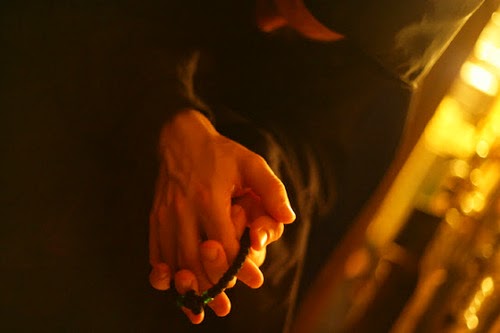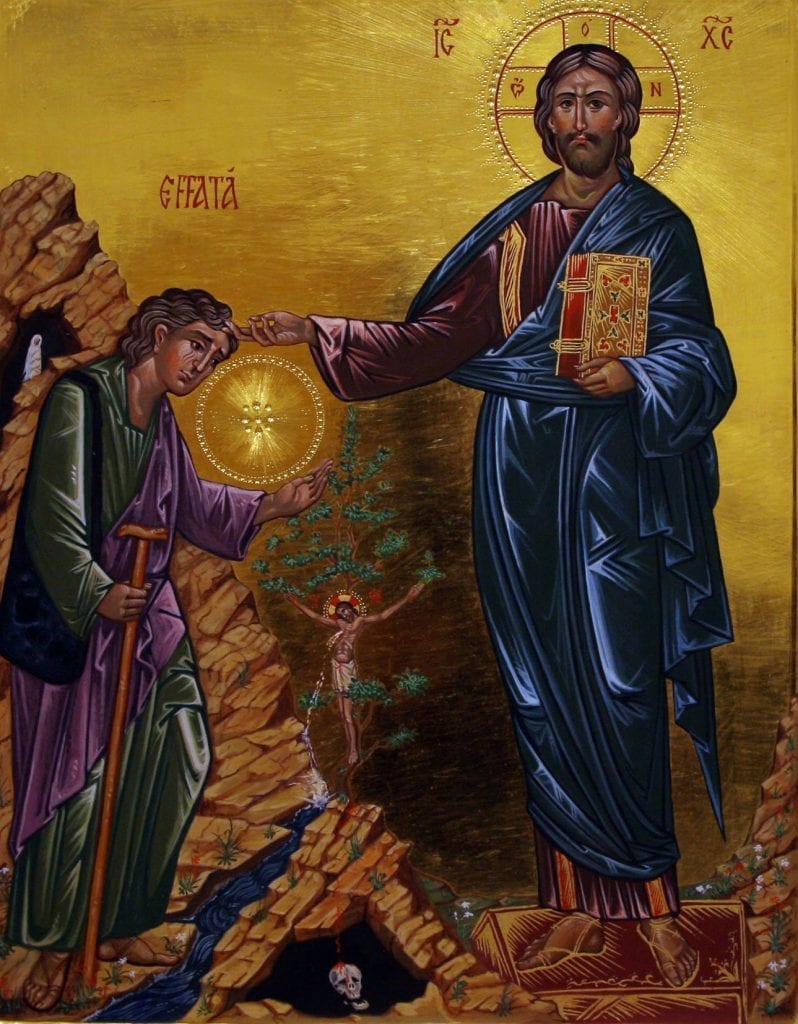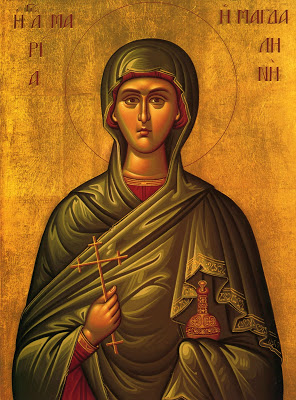HOMILY: Christ the King – December 8, 2019
Readings: Daniel: 7:13-14, Colassians 1:12-20, John 18:33-37
In the name of the Father, and the Son, and the Holy Spirit, One God. Amen.
We have come to the end of our liturgical year, through the course of which we have celebrated the birth of Christ, and the joy and salvation that his coming promises to bring. We have celebrated the theophanies of Christ our God, wherein the truth of God has been revealed to us. We have remembered the passion of Christ and repented of our own iniquities through the penitential season of Lent. We have celebrated Christ and the lives of the saints surrounding Him and following Him, that we may remember their lives and examples for each of us to follow. We once and always look forward with expectation from the moment of Christ’s birth, from the moment of our present lives lived in Christ, to the coming of Christ our King and our God. He entered the world as a suckling child, from the womb into the care of the Theotokos; became the sacrifice for all men that the whole world might be redeemed; and ascended into heaven to sit at the right hand of God the Father. He shall come again as a conquering king, who conquered death by death; who is the King of Kings; who is the Lord of all creation; He who is the head of the body, the Church, which is His Kingdom on earth. Within the Church, which Christ created with his own precious blood, we find the Truth, the Way, and the life. This is the Kingdom of God.
The Kingdom of God is life within him, and it is this Kingdom to which we all belong as citizens of heaven, for as Saint Paul says, “our citizenship is in heaven, and from it we await a Savior, the Lord Jesus Christ,” our King and our God. He also elucidates the kingdom of God as life in the Holy Spirit, “For the kingdom of God is not a matter of eating and drinking but of righteousness and peace and joy in the Holy Spirit.” So, we recognize the Kingdom as that which is already given to those of us who believe; to those of us who live and lead righteous lives under God our King; to those of us who incarnate the Kingdom of God into this world, and by whom this kingdom is created by the grace of God. We are Christ’s first and foremost, and if the first “flag” we fly is not Christ’s, then one must ask if He is truly our King and our God? The flag of nations should never precede the flag of faith. The flag of this world is not our own, for we are citizens of heaven first and only; for, we are but “sojourners and exiles in this world,” and should live as though we have no permanent part in it. For there is nothing in this world that is worth our lives in Christ; nothing in this world that can give us true joy; and nothing in this world that will endure in this life or the next.
Christ is our King, and the Kingdom over which he reigns has no place, it has no borders and holds no land; it has no end and begins in all places; it excludes no one, but includes only the faithful. We know where the kingdom rests by the fruits of its people, for Christ himself has said the people “will know that you are my disciples, if you have love for one another.” This is also the same quality by which we know Christ loved us, for he sacrificed himself that we may live life eternally. So then, what is a Christian life without sacrifice, but an empty and vestigial expression of a divine truth. True love engenders sacrifice, a sacrifice of self; of free will. It is through the sacrificial quality of love by which it is recognized. It is within the sacrificial quality of love that the Kingdom of God is found, for God is Love. It is with Love that Christ reigns as King over all creation.
Christ as King permeates our prayers; is echoed throughout our scriptures; is made manifest within the liturgy and sacramental life of the Church; so, likewise it should be made apparent that Christ is our King in our day to day lives. The culture in which we live reflects the contents of our inner being. If our culture is not changed, it is because we ourselves are not changed. This is why Saint Seraphim of Sarov exhorted that if we “acquire the Spirit of Peace, a thousand souls around you will be saved.” So, it is within society that we will express the contents of our heart in word and in deed, wherein society becomes a mirror of what lies within. It is where the Kingdom of God collides with the kingdom of this world that Christ’s love should manifest itself. How do we treat the homeless man or the mother in need? How do we react to the myriad inconveniences throughout the day? How do we respond to those who are less than pleasant towards us or others? How do we speak to those who are seen as social outcasts: addicts, criminals, prostitutes, the poor and needy, the disabled, and all of the others who do not align with the image of worldly success? We have already been given the answers to these questions by Christ our King, and he pulls us inexorably towards love.
Christ as King reigns over our very souls. It is by his grace alone that we are pulled godward; that every word we speak is one of praise or kindness; that every beat of our heart and every breath we take is done with thanksgiving; that our everyday and ordinary deeds are made extraordinary by their love and compassion for one another; that our own feelings and desires should be an echo of Christ the King, and that which His love desires. Our will is not our own, but that of the King who reigns over all: Jesus Christ our Lord. We can be slaves to the sins of this world, or freedman following their King and their God.
Christ our King has freed us from the bondage and slavery of sin, the passions that compel us to do that which we ought not to do. He commanded us to repent, and so we turn ourselves away from this world. He commanded us to baptize and be baptized, and so the faithful are made clean, “made whiter than snow.” He commanded us to “do this in remembrance of me;” so, we celebrate and partake of his body and blood as often as we can through the Eucharist. We are commanded to “be perfect,” just as the Father is perfect; a feat that can only be accomplished through theosis: our growth and exercise of virtue, and our cooperation with the graces of God. Among these commands, and others like it, Christ tells us, “If you love me, you will keep my commandments.” Our Love for Him is known and is proven by what we do. Our love of God is made manifest by our willingness to obey him, and to serve him, and also those in his kingdom. Christ came to serve, so we also serve. Christ came to heal, so let us be a healing presence to all. Christ came to forgive, so let us forgive one another. Christ came to reign over us, so let us always allow Him to reign in us.
Christ is King, and He is a just king, for the Justice of God is the restoration of all creation as God intended it from the beginning of time. Christ is a righteous king for He is righteousness. Christ is a conquering king, for he has conquered and defeated death by death, and in doing so “He has delivered us from the domain of darkness and transferred us to the kingdom of his beloved Son, in whom we have redemption, the forgiveness of sins,” just as Saint Paul exhorted in our epistle reading for today. Christ is our King, and in Him we have faith and find hope, for “to him was given dominion and glory and a kingdom,that all peoples, nations, and languages should serve him; his dominion is an everlasting dominion, which shall not pass away, and his kingdom one that shall not be destroyed,” just as Daniel prophesied. Christ is our King, and Christ is our God, for in Christ alone was the fullness of God pleased to dwell among us. So, We look forward to the completion and perfection of all things in and through Christ the King, the ruler and redeemer of all things. We adore the King of Kings as we bask in the countenance of his holiness and eternal glory, and pray always that we ourselves would be found worthy of the promises of Christ. Christ is the King of mercy, and may he have mercy on us all, and save us.
“Oh come let us worship and fall down before our God and our King.
Oh, come let us fall down before Christ our King and our God.
Oh, come let us worship and fall down before Christ himself, our King and our God.”
Amen.










